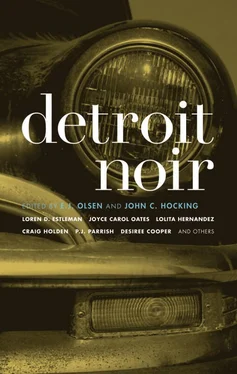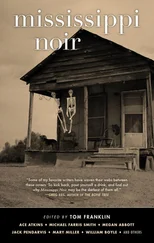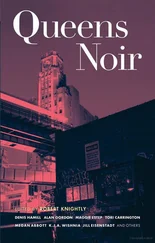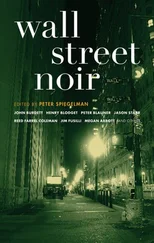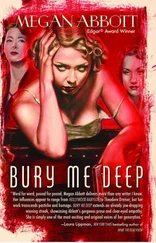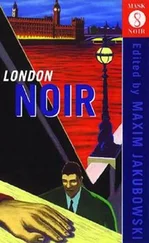Megan Abbott - Detroit Noir
Здесь есть возможность читать онлайн «Megan Abbott - Detroit Noir» весь текст электронной книги совершенно бесплатно (целиком полную версию без сокращений). В некоторых случаях можно слушать аудио, скачать через торрент в формате fb2 и присутствует краткое содержание. Город: New York, Год выпуска: 2007, ISBN: 2007, Издательство: Akashic Books, Жанр: Детектив, на английском языке. Описание произведения, (предисловие) а так же отзывы посетителей доступны на портале библиотеки ЛибКат.
- Название:Detroit Noir
- Автор:
- Издательство:Akashic Books
- Жанр:
- Год:2007
- Город:New York
- ISBN:978-1-933354-39-2
- Рейтинг книги:3 / 5. Голосов: 1
-
Избранное:Добавить в избранное
- Отзывы:
-
Ваша оценка:
- 60
- 1
- 2
- 3
- 4
- 5
Detroit Noir: краткое содержание, описание и аннотация
Предлагаем к чтению аннотацию, описание, краткое содержание или предисловие (зависит от того, что написал сам автор книги «Detroit Noir»). Если вы не нашли необходимую информацию о книге — напишите в комментариях, мы постараемся отыскать её.
delivers unforgettable tales that capture the city’s dark vitality.
Includes stories by: Joyce Carol Oates, Loren D. Estleman, Craig Holden, P.J. Parrish, Desiree Cooper, Nisi Shawl, M.L. Liebler, Craig Bernier, Joe Boland, Megan Abbott, Dorene O’Brien, Lolita Hernandez, Peter Markus, Roger K. Johnson, Michael Zadoorian, and E.J. Olsen.
Detroit Noir — читать онлайн бесплатно полную книгу (весь текст) целиком
Ниже представлен текст книги, разбитый по страницам. Система сохранения места последней прочитанной страницы, позволяет с удобством читать онлайн бесплатно книгу «Detroit Noir», без необходимости каждый раз заново искать на чём Вы остановились. Поставьте закладку, и сможете в любой момент перейти на страницу, на которой закончили чтение.
Интервал:
Закладка:
Listen, I’m not going to get nostalgic; I’m not going to bend your ear about the heyday when bleacher creatures and CEOs focused on the same thing — warm hot dogs, cold beer, and a Major League pennant — or how Michigan Avenue suddenly popped bright when the outfield lights snapped on. I could see them from my bedroom window; I could hear the crack of the bat and I always pretended it was Kaline or Horton, the guys my father said were heroes, giving the opposing team pure hell. Why am I telling you this? Because people’s low-level fear after the depot closed turned into full-on panic when Tiger Stadium shut down, when Corktown’s seemingly sturdy bookends fell, crushing us under their collective weight. People grew sad when they realized they could no longer describe the boundaries of their city as anything within a one-mile radius of the pitcher’s mound, and they grew hopeless when they watched Reedy’s and the Gold Dollar get nailed up tight, graffiti-splattered boards covering multi-paned antique windows crafted by their Irish ancestors nearly two hundred years before. People change when they watch their heritage being obliterated, when they walk past vacant buildings every day, when they feel the luster fading from their lives. They do desperate things. I’m not making excuses for Mrs. O’Leary, who had the best intentions, after all; I’m just telling you how it was.
When our Trumbull lot closed I was out of a job, which was bittersweet for my father, who didn’t care for his twenty-two-year-old daughter collecting money in parking lots but who could also cast his eyes across the cars and calculate the night’s take in mere seconds. For a while I just kicked around Detroit, thinking with my associates degree in Business Administration I might get a part-time office job in the Fisher Building, hopefully near the top floors so I could watch the peregrine falcons loop and dive into the chaos below. What did they see from their skytop perches? Not the smoke from the Seven Sisters; those stacks had been detonated three years before in ’96. I wondered what the falcons thought of the sixteen-story dust cloud that turned their daytime sky dark for three full minutes after the Hudson’s Building on Woodward was imploded two years later. Then I realized that what they thought mattered about as much as what I did.
Jefferson Avenue looked so much brighter than Michigan Avenue as I traipsed along in my mid-heeled shoes, resumé tucked into the small briefcase my father used on insurance calls. Why was I relieved when told I was overqualified for the receptionist’s job at the ad agency in the Ren Cen, when Du-Mouchelles said they’d prefer to hire someone with knowledge of Royal Doulton pottery, when the dental office in the Fisher Building never called back? My father said I’d been ruined for indoor work, that working outside even in inclement weather beats the hell out of typing letters in the nicest office. He was right. At night I’d sometimes walk to the lot for old times’ sake, past the Corktown houses with their crumbling Queen Anne turrets, Georgian Revival roof lines, Greek columns — what were the city planners thinking? Things that were once charming became irritating. The antique buildings felt old and lifeless, the formerly vibrant skyline a jagged silhouette in the pre-night dusk, the family-owned bars a haven for punk and goth wannabes, their pink rubber miniskirts and chain-draped leather dresses hiked up for the jump onto handmade mahogany barstools. The bars that were trying to weather the economic storm — LJ’s, Casey’s Pub, the Parabox — did it by offering dirt-cheap drink specials, and kids sporting neck corsets, rhinestone sunglasses, and platform boots studded with more straps and buckles than a straitjacket, would sweep through Corktown for a quick buzz before moving on to the night’s real adventure at St. Andrew’s or City Club. They wrapped their tattooed hands around the brass bar rail, slipped their studded tongues into the tall pilsner glasses, and we felt violated. They were the dark infiltration of the outside world. Part of me understood — I was young, I went to college with kids like this, I saw their need to be provocative — but the timing was just bad. Everything was falling apart, and they seemed to be leading the charge. Well, Mike Ilitch and Dennis Archer led the charge, and the painted and hole-punched kids, like entitled vultures, picked at the carrion in their wake.
My loyalty to Corktown and the fact that the intermittent classes I was taking at Wayne State weren’t going to pay for themselves led me to O’Leary’s Tearoom at Brooklyn and Porter, where I took a job waiting tables and reading tarot cards in the afternoons for rich ladies from West Bloomfield or Northville who had nothing better to do than to seek out the novelty of a town that they were too dim or too dismissive to see was drowning before their eyes. They lifted the homemade shortbread to their lips with soft, tanned hands and tapped manicured nails against off-white china cups as they sipped Irish Breakfast tea while waiting their turn at the tarot table. Mrs. O’Leary was the true psychic, though, had worked hard to teach me the cards herself, but she never ever read for these women. She served their scones and muffins with a smile, poured their tea while exchanging pleasantries, but later she would say what small, sad lives they lived, that she couldn’t read for them because she’d have to tell the truth. Honesty above all else was her motto, and the motto of her mother and her mother’s mother, ad infinitum, traveling in the minds and sensibilities of the O’Leary women from across the Atlantic, remaining intact all the way from County Cork. The words, in Gaelic, had been carved into a wooden plaque and hung over the front door of the tearoom. Locals can handle it, she said, the Irish are strong, practical, resilient. But if she told these women the truth, they’d never come back, and then where would we be? That’s why I read for them. It wasn’t that I didn’t believe in the truth, I just wasn’t a good enough psychic to see it. What I saw clearly were the women’s designer clothes and leather shoes, their diamond-studded watches and sharp haircuts, and their lives didn’t look small to me, but, as I said, I was never able to see the things that Mrs. O’Leary did. Telling this story now makes me miss everything: the weed-smothered Trumbull lot, Tiger Stadium glowing like an earthbound constellation, the tearoom with its lace doilies and antique spoons, Mrs. O’Leary with her black tooth and her visions of misery.
She did not see good things in Detroit’s future; she said she dreamed of flood waters gushing over the banks of the Detroit River, a tidal wave as tall as Cobo Hall consuming Grand Circus Park, then fanning eastward to smother Greek-town and westward to our very doors, water rising to overtake the front steps of Corktown’s crumbling worker’s cottages. She stared at the window, and it was as if she could see the nightmare being projected there. “Begorra,” she said, fingering the Celtic cross over her breast, her eyes far, far away, “there was a torrent on Porter, and we were in it, you and me, the tearoom gone, my china cups bobbing around like corks.” After noticing my horrified expression she smiled. “Ah!” she said. “Just a silly dream. It’s this casino stuff’s got me thinking too much.”
Despite the fact that citizens had twice voted against it, the mayor had just granted a license to MGM to build a casino in Detroit, and Mrs. O’Leary said she’d be damned to hell and roasted crisp before she sat back and let them build.
“They’re all crooked,” she’d said, the Free Press and Detroit Monthly spread across the table before her. “Politicians steal our money and give it to these greed mongers. This one’s mother died, this one’s wife’s having an affair. What do they care as long as they can build their casino? Come here and look at what they’re doing to your city.” She made me read about the latest political graft or look at the smug grin of a socialite newly arrived on Detroit’s small glamour circuit. “Look at that,” she’d say, poking her chubby finger into the face of the offender, her tone bursting with rancor. Sometimes I’d see her pull out the White Pages, address an envelope in her looping cursive, and drop her business card inside, and I’d wonder who was on the receiving end of her selective advertising. But she wrote many letters: to her family back in Cork, to the newspapers, to watchdog groups, to the mayor’s office. Though I was young, my future not necessarily tied to Corktown, even I understood her anger over its recent state, her worry over the fate of her business. Mrs. O’Leary, for her part, was convinced that if the MGM people knew how desperate the people of Detroit were — Who’s going to put fifty dollars down on a blackjack table? They’ll come in and rob the place, that’s what they’ll do! — they would thank the mayor kindly and be on their way.
Читать дальшеИнтервал:
Закладка:
Похожие книги на «Detroit Noir»
Представляем Вашему вниманию похожие книги на «Detroit Noir» списком для выбора. Мы отобрали схожую по названию и смыслу литературу в надежде предоставить читателям больше вариантов отыскать новые, интересные, ещё непрочитанные произведения.
Обсуждение, отзывы о книге «Detroit Noir» и просто собственные мнения читателей. Оставьте ваши комментарии, напишите, что Вы думаете о произведении, его смысле или главных героях. Укажите что конкретно понравилось, а что нет, и почему Вы так считаете.
